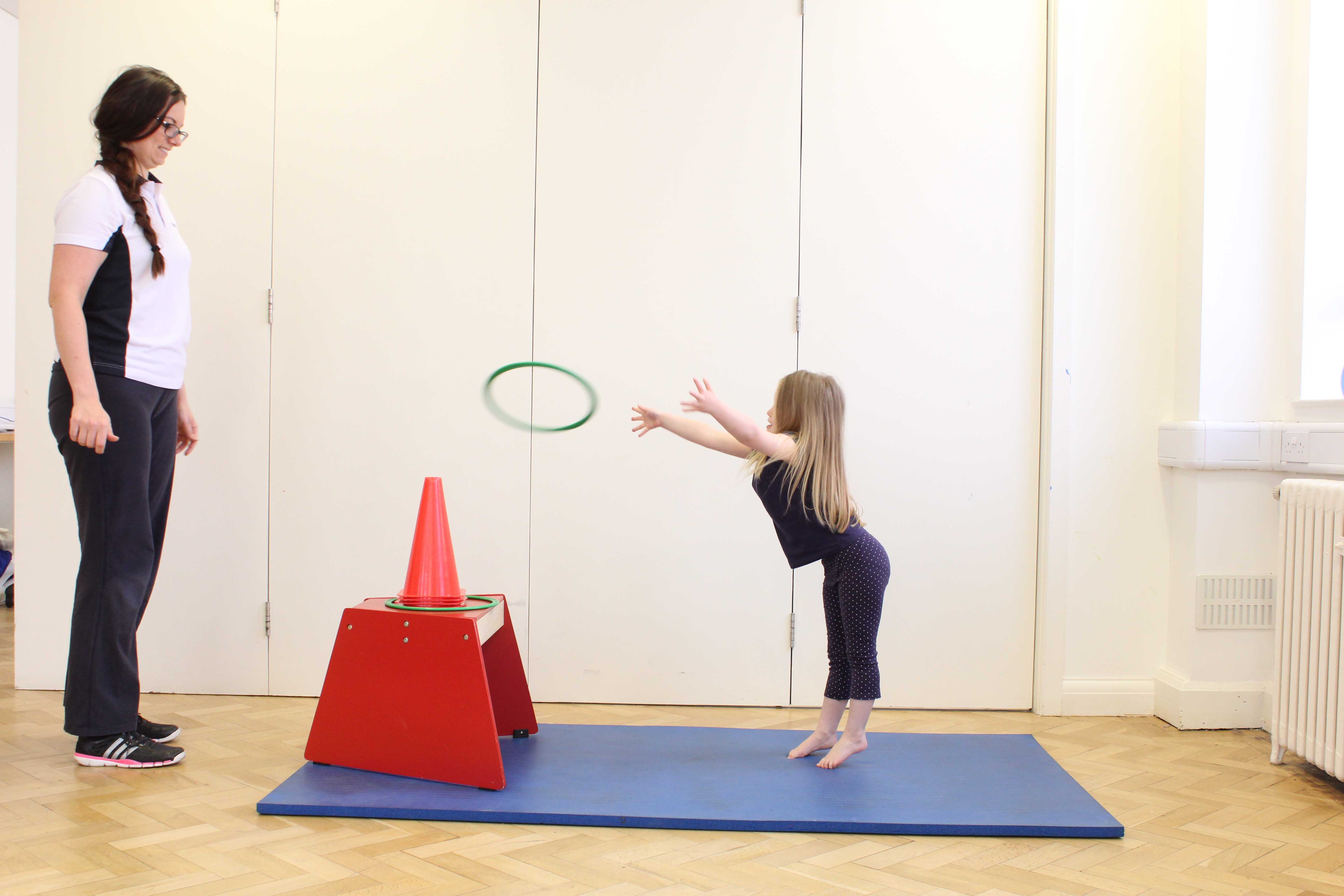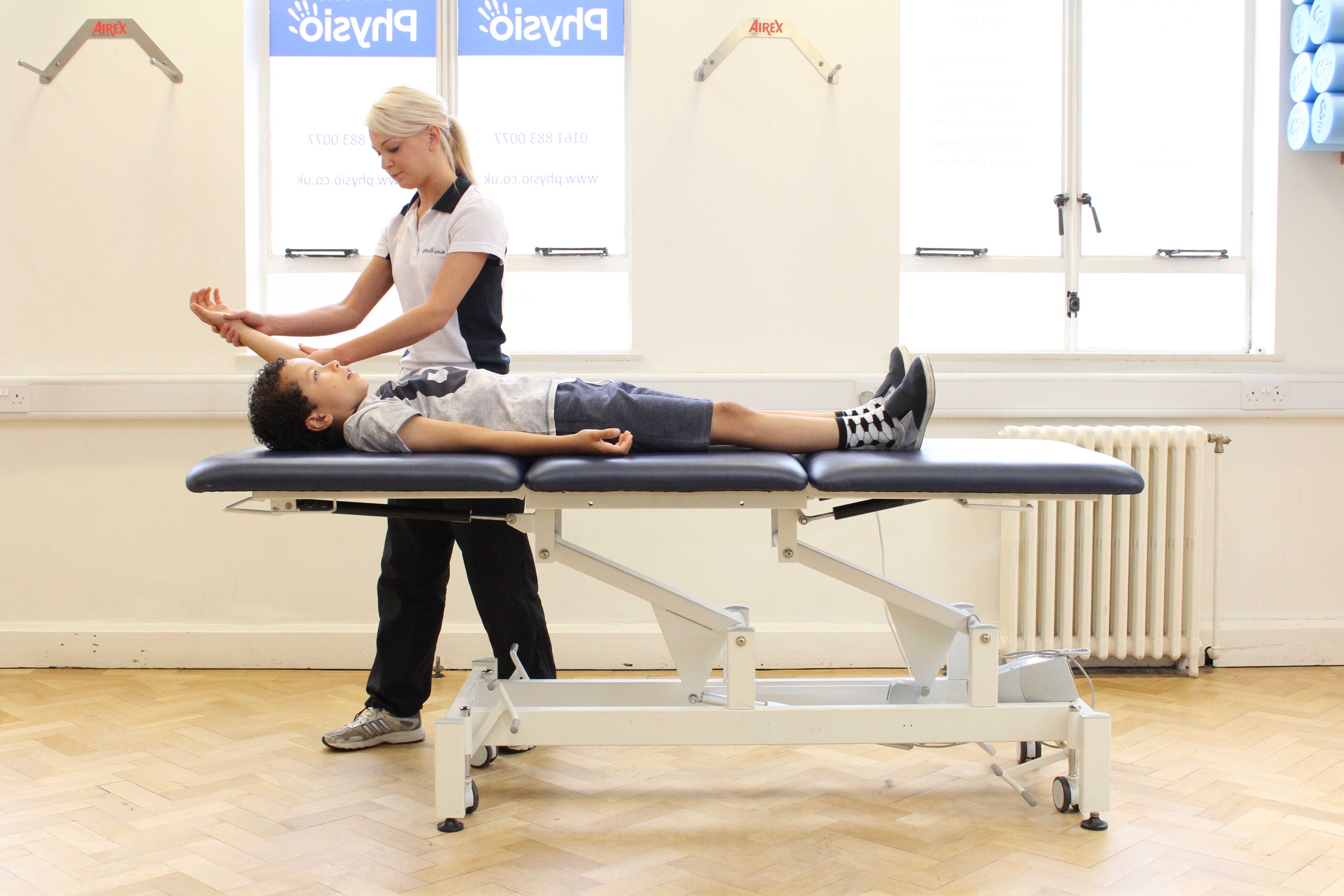What is adult hydrocephalus?
Adult hydrocephalus is an excessivebuild-up of cerebrospinal fluid (CSF) in the ventricles of the brain which causes them to enlarge and alters pressure inside the head. Hydrocephalus in adults can be caused by any condition that blocks the flow of cerebrospinal fluid (CSF) causing the enlarged fluid-filled ventricles to damage brain tissue. The damage to the brain can result in a wide range of symptoms including headache, vomiting, blurred vision, weakness in the legs, balance problems and difficulty walking.
What causes hydrocephalus?
Adult hydrocephalus can develop following infection, meningitis, a brain tumour, stroke, head trauma and brain haemorrhage. However, the exact cause of hydrocephalus is often unknown.
 Above: Specialist physiotherapist assisting mobility and co-ordination exercises.
Above: Specialist physiotherapist assisting mobility and co-ordination exercises.Types of hydrocephalus
The types of hydrocephalus that primarily affect adults include hydrocephalus ex-vacuo and normal pressure hydrocephalus.
Hydrocephalus ex-vacuo occurs when there is damage to the brain caused by stroke or injury, resulting in loss or atrophy (shrinking) of the brain tissue.
Normal pressure hydrocephalususually affects people over 50 years of age which may develop following injury to the brain such as a brain haemorrhage, head trauma, infection, tumour, or complications of surgery. However, normal pressure hydrocephalus can develop even when none of these factors are present for reasons that are unknown.
Diagnosis of hydrocephalus
Adult hydrocephalus is usually diagnosed using a CT scan (computerised tomography) or MRI (magnetic resonance imaging) scan. Normal pressure hydrocephalus can be difficult to diagnose as symptoms develop slowly over a period of time which can be similar to more common conditions, such as Alzheimer's disease. A neurologist will examine your gait, cognitive ability, urinary symptoms and how your brain appears in the CT or MRI to confirm a diagnosis.
 Above: Balance and proprioception exercises assisted by a neurological physiotherapy
Above: Balance and proprioception exercises assisted by a neurological physiotherapyWhat are the effects/symptoms of hydrocephalus?
In adults, symptoms of hydrocephalus can include:
- Difficulty with walking including inability to begin walking (gait apraxia)
- Weakness of the legs
- Problems with balance
- Ataxia (loss of coordination and movement)
- Sudden fall without loss of consciousness or other symptoms (drop attacks)
- Memory impairment
- Urine incontinence
- Headaches
- Fatigue
Treatment for adult hydrocephalus is usually surgical which involves using a shunt tube to divert the excess fluid in the brain to the abdominal cavity or the pleural space (this is the space inside the chest cavity). Physiotherapy following surgery will help support you through your recovery.
Physiotherapy for adult hydrocephalus
Physiotherapy treatment at Physio.co.uk will help a person with hydrocephalus manage their physical symptoms such as gait instability, history of falls, balance disturbances, and decreased endurance. At Physio.co.uk our specialised physiotherapists will focus on:
- Maximising your mobility
- Improving your gait pattern
- Improving posture
- Maximising your functional ability with everyday tasks
- Maximising balance in sitting or standing, with or without an assistive device
- Improving fitness levels and exercise endurance
- Improving transfers such as sitting to standing
Physiotherapy treatment at Physio.co.uk may include:
- Aerobic and endurance conditioning
- Flexibility exercises incorporating stretching and range of movement exercises
- Strength, power, and endurance training
- Functional mobility training to improve your gait pattern
- Improving awareness of posture in static and dynamic activities.
- Activities which focus on facilitating self-care and daily management at home
- Activities which focus on improving bed mobility and transfers
- Use of assistive devices and mobility equipment if necessary
For more information, or to book an appointment please call 0330 088 7800.

 0330 088 7800
0330 088 7800





































